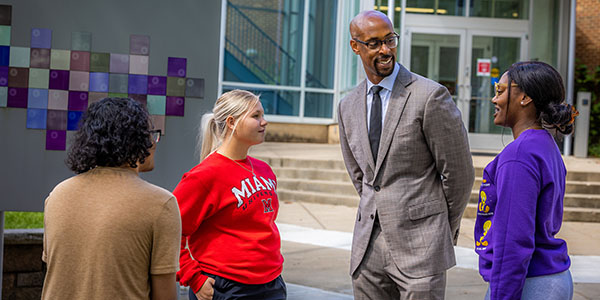Miami University advances affordability for students in several ways
Billion-dollar campaign will dedicate $400 million for scholarships

Miami University advances affordability for students in several ways
“College affordability and return on investment is top of mind for families and students,” said Rachel Beech, vice president for Enrollment Management and Student Success. “We are dedicated to finding innovative strategies to reduce education costs with a focus on opportunities and outcomes for Miamians.”
Miami’s $1 billion campaign, the largest in history, will dedicate $400 million for need-based and merit scholarships.
“Scholarships are the highest funding priority at Miami as we know they can change students' lives and futures,” said Brad Bundy, vice president for University Advancement.
Since its launch in 2016, the campaign has raised $730 million, including $286 million for scholarshps, he said. That includes a $30 million gift from David Dafoe ’84 for need-based scholarships.
Two programs at the Regionals known for advancing affordability include the Early College Academy and Work+ program.
Miami’s Early College Academy enables high school juniors to attend Miami’s regional campuses and take a full set of college courses at no cost through Ohio’s College Credit Plus program.
They graduate with both a high school diploma and an associate degree from Miami, giving them a head start on higher education while maintaining their high school social experiences through access to clubs, sports, and events.
The Work+ program enables full-time students to work part-time with partner companies that cover the total cost of Regionals tuition. Work+ students graduate with a degree and a four-year work resume.
“Our Early College Academy and Work+ programs are innovative pathways for students to achieve not just a debt-free but in some cases a fully free education,” said Ande Durojaiye, vice president of the Regionals and dean of the College of Liberal Arts and Applied Science.
Miami is a national leader in addressing soaring tuition costs and student debt in an environment of reduced public resources.
Pete Haverkos, regional assistant dean for student and academic success, said, "We set out with a clear vision, and now that it's in motion, we're seeing real results — students are earning their college degrees with little to no debt, which is crucial for opening doors to opportunity without financial burdens holding them back.”